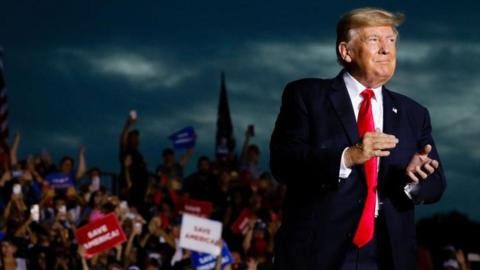
Trump
Unusual scene as Trump may be sentenced before his inauguration
Days before his second inauguration, President-elect Donald Trump faces the uncomfortable prospect of appearing — in person or virtually — before a New York state judge to be sentenced for his 34 felony convictions for falsifying business records to cover up a hush money payment to an adult-film actress.
The court appearance, scheduled for Friday, offers yet another reminder of the legal woes that dogged Trump as he mounted his third bid for the White House. It also cements a distinction that he shares with none of his predecessors: He will be the first serving president who is also a felon. No previous president has been convicted of a felony, let alone summoned before a judge just days before their inauguration.
While New York Supreme Court Justice Juan Merchan said he will not sentence Trump to jail time, the appearance will be an opportunity for the judge to denounce what he has called the “premeditated and continuous deception by the leader of the free world.”
“It’s a reminder that we live, politically speaking, in a split-screen America,” said Tim Naftali, senior research scholar at Columbia University’s School of International and Public Affairs. “For some Americans, [Trump’s] legal difficulties were a reason to vote for him because it deepened their sense that they, like him, were victims.”
“The fact that the procession to the inauguration will include yet another trip to court, it’s consistent with the peculiarities of Donald Trump’s return to power,” Naftali added.
In the hours after Merchan upheld Trump’s conviction and scheduled his sentencing, the president-elect railed against the judge, his political opponents, and the federal justice system that his appointees will soon oversee,.reports the Washington Post.
At 8:43 p.m. Friday, Trump complained on social media that he was “the only Political Opponent in American History not allowed to defend myself.” At 7:29 Saturday morning, he was back at it, describing Merchan as “corrupt” and “crooked” and calling for him to be “disbarred.”
The president-elect also lamented that his prized Florida home, Mar-a-Lago, was undervalued at $18 million in a separate New York civil fraud case (“it is worth 50 to 100 times that amount”) and repeated his claim that he had never met writer E. Jean Carroll, who alleged that he sexually assaulted her in a New York department store decades ago. In 2023, a civil jury in New York found Trump liable for sexually abusing and defaming Carroll. In December, a federal appeals court upheld the jury’s $5 million verdict against the president-elect.
At 8:03 a.m. Saturday, Trump posted again, complaining that “there has never been a President who was so evilly and illegally treated as I. Corrupt Democrat judges and prosecutors have gone against a political opponent of a President, ME, at levels of injustice never seen before.” He proceeded to complain about special counsel Jack Smith.
Trump also frequently talked about his legal cases on the campaign trail, describing them as a “witch hunt” and portraying himself as the victim of a weaponized federal justice system, even though local authorities brought two of the criminal cases against him, and Smith, acting independently of the White House, brought the two federal cases against him.
But Trump’s comments Friday and Saturday indicated that winning the election — and evidence that the cases against him may have aided him in the contest — hasn’t changed his message.
Some polls early last year had suggested that a criminal conviction would hurt Trump politically. In an AP-NORC Center for Public Affairs Research survey in April, half of U.S. adults polled said they would view Trump as unfit for president if he were convicted in the hush money case. Yet Trump also tried to capitalize politically on his seven-week trial, despite often appearing angry and frustrated in court. He addressed reporters frequently, reading printouts of news articles about legal scholars defending him and falsely claiming that “every legal scholar” had said there was no case against him.
After Trump’s May 30 conviction in the hush money case, donations to his campaign surged, essentially erasing President Joe Biden’s fundraising advantage at the time.
The New York criminal case is the only one still dogging Trump as he prepares to return to the White House. After Trump won the election, Smith asked a judge to drop his indictment in the federal election interference case because of the Justice Department’s policy against prosecuting a sitting president. Last year, Judge Aileen M. Cannon dismissed the classified-documents case against Trump, saying — in a decision that contradicted precedent — that Smith had not been properly appointed.
Trump’s case in Georgia, where he and allies are charged with conspiring to overturn the 2020 election, has been delayed by allegations of prosecutorial misconduct. Many experts say it cannot move forward against Trump while he is president.
But even as Trump’s election victory has given him at least a temporary reprieve from most of his legal woes, his expected return to the courtroom ahead of the Jan. 20 inauguration illustrates the unprecedented nature of his candidacy — and presidency.
On Jan. 10, 2009, for example, President-elect Barack Obama stopped by Ben’s Chili Bowl and visited the Lincoln Memorial with his wife and daughters. On Jan. 10, 2001, President-elect George W. Bush visited the Pentagon. But on Jan. 10, 2025, Donald Trump is expected to be in court.
